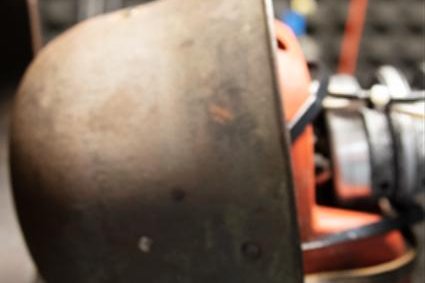A World War I-era helmet used by French soldiers underwent shock wave tests and was proven to be superior to modern combat helmets, a study released on Friday concluded. Photo courtesy of PLOS ONE
Feb. 14 (UPI) -- A French army helmet used in World War I was as valuable in protecting from shock waves as modern counterparts, a Duke University study revealed on Friday.
The Adrian helmet, designed to deflect shrapnel and used by French military forces in a war which ended in 1918, actually performed better than modern helmet designs in protection from the shock from overhead blasts.
The study, published Friday in PLOS ONE, was part of research into blast waves and the value of helmets designed to protect from bullets and other penetrating objects.
Blast waves, or shock waves, can cause pulmonary trauma, known as chest trauma, an issue corrected with improved body armor and the reason behind a decline in pulmonary trauma incidents in combat. The waves can also cause brain damage, and no current research suggests that modern helmets are designed to specifically offer blast protection.
The vintage helmets were compared to modern combat helmets in tests involving helmet-wearing dummies and exploding overhead tubes pressurized with helium to simulate shock waves.
When the results were compared with the use of brain-injury charts, all tested helmets were found to offer a reduction in moderate brain bleeding. The French Adrian helmet tested, manufactured in 1915, offered the least risk for brain bleeding of all helmets tested.
"The result is intriguing because the French helmet was manufactured using similar materials as its German and British counterparts, and even had a thinner wall," lead researcher Joost Op't Eynde said in a press release. "The main difference is that the French helmet had a crest on top of its crown. While it was designed to deflect shrapnel, this feature might also be deflecting shock waves."
The finding, researchers say, proves that continued research into protection from shock waves is essential for preventing the effects of sustaining them.















